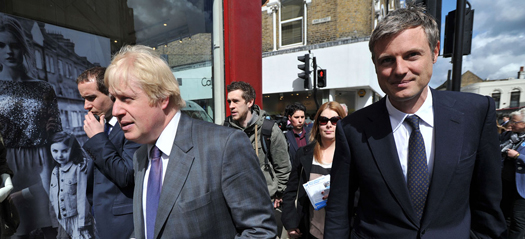
High-profile Islamophobic incidents involving PM Boris Johnson and Lord Zac Goldsmith were highlighted in the report. (Credit: Andrew Parsons/i-Images)
Hamed Chapman
The Conservative Party has accepted all recommendations set out by an investigation into racism and discrimination among its members, particularly against Muslims and even apologised for Islamophobic remarks made by its leader Boris Johnson.
“Any incident of discrimination is wrong, and we must work harder to stamp out discrimination of all kinds,” Co-Chair Amanda Milling said when officially responding to the findings led by Professor Swaran Singh, an NHS Consultant.
“On behalf of the Conservative Party I would like to apologise to anyone who has been hurt by discriminatory behaviour of others or failed by our system,” Milling said.
In the Singh Investigation report, Johnson admitted as he attempted to separate what he had written for newspapers that he did “know that offence has been taken at things I’ve said, that people expect a person in my position to get things right.”
“In journalism, you need to use language freely. I am obviously sorry for any offence taken. Would I use some of the offending language from my past writings today? Now that I am Prime Minister, I would not.”
Former Tory Chair Baroness Warsi, who has constantly accused her party of being institutionally racist against Muslims, described Johnson’s apology of being “mealy-mouthed” after excusing his writings as often being “parodic, satirical.”
The report, by the Professor of Social and Community Psychiatry at Warwick University, was the result of a pledge made by Johnson in 2019 when seeking to become Conservative Leader. But instead of being about the extent of Islamophobia among its rank and file members, the report was watered down into a vague “investigation into alleged discrimination” within the party.
Even so, its findings included that “judging by the extent of complaints and findings of misconduct by the party itself that relate to anti-Muslim words and conduct, anti-Muslim sentiment remains a problem within the Party.”
“This is damaging to the party, and alienates a significant section of society,” Singh warned. Despite the Party leadership claiming a ‘zero-tolerance approach’ to all forms of discrimination, “our findings show that discriminatory behaviours occur, especially in relation to people of Islamic faith.”
“The data collection of such incidents weak and difficult to analyse, hampering early identification of problems and effective remedial action,” the report said, spelling out that the party needs to be “explicit and specific about what ‘zero tolerance’ means in the context discrimination, both in policy and practice.”
One of the most damning indictment was the continual denial by Zac Goldsmith that his campaign against Labour’s Sadiq Khan during the London Mayor elections in 2016 was explicitly Islamophobic, complaining instead opponents had used race as a tactic against him.
Goldsmith, who was even subsequently rewarded by Johnson after losing the election with a peerage in the House of Lords, did acknowledge that “a large number of Muslim Londoners felt personally insulted by what they had been told was my campaign message” and that it had become “ a source of major regret and sadness on my part.”
The Muslim Council of Britain (MCB) gave a rather cautious response to the report even though many of the recommendations reflected some of their longstanding concerns but without the Tories being prepared to acknowledge the scale of the problem.
“The investigation primarily deals with form over substance. Procedure is important, but it needs to be underpinned by dealing with the deep-seated issues of institutional racism,” said MCB Secretary General, Zara Mohammed.
“We hope that this is the starting point of the Party’s own self-reflection. Regardless, it is imperative for the Equalities and Human Rights Commission to determine whether any breaches of law have taken place,” she said.
Such was the weakness of the report that it was criticised by senior Muslim figures within the party as being inadequate and failed to address deep prejudices held by some Tory members. “The manner in which this inquiry has been conducted means it is nothing but an attempt to whitewash deep-rooted issues out of sight,” said Sajjad Karim, a former Tory MEP, who chaired the European Parliament’s working group on Islamophobia for over a decade.
“It is difficult to identify any basis upon which this has been a serious attempt to address credible and serious matters or deliver on Boris Johnson’s leadership election pledge,” Karim said.
“If anything, it acts as an illustration of an attitude inclined to view Islamophobia as an irritant best pushed to one side, when not being utilised in promoting culture wars, rather than as a serious systemic issue which needs to be rooted out.”
Former Chancellor, Sajid Javed, who helped to initiate the inquiry, welcomed the publication while emphasising that stamping out discrimination, whether against Muslims or other minority groups, is “an issue where our country’s political parties have a responsibility to demonstrate leadership.”
In an article for The Times, Javid said that “prejudice towards Muslims is significantly more widespread than for other minorities” and quoted research suggesting that still a “quarter of the public would still feel uncomfortable being represented by a Muslim MP.”
“At every level and branch, our duty is to influence, not to be influenced. To set an example and hope that others will follow.”